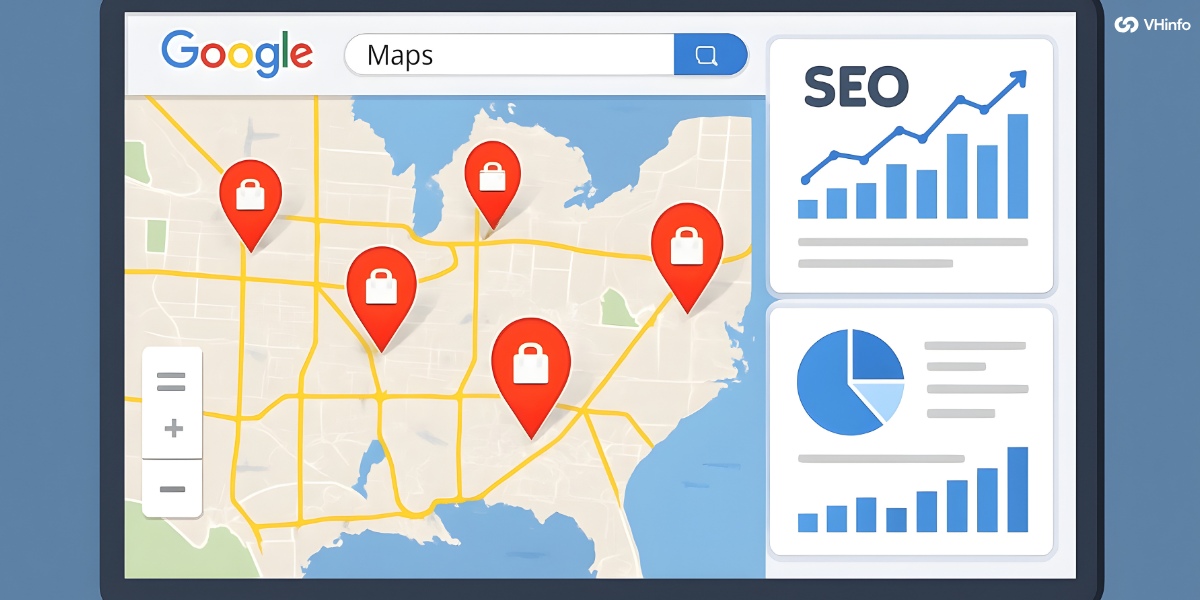As a SaaS company, driving organic traffic to your website is important for sustainable growth. However, one often overlooked issue that can hinder your SEO efforts is keyword cannibalization.
At VH Info, we understand the importance of identifying and resolving keyword cannibalization to optimize your search engine rankings and attract potential customers.
In this comprehensive guide, we’ll dive deep into what keyword cannibalization is, how it impacts your SEO, and the best strategies to find and fix it using the right tools and techniques.
What is Keyword Cannibalization?

Keyword cannibalization occurs when multiple pages on your website compete for the same keyword or phrase in search engine results.
When you have several pages targeting similar keywords and fulfilling the same search intent, search engines like Google may struggle to determine which page is most relevant to rank higher.
As a result, your pages end up “cannibalizing” each other’s search rankings, leading to lower visibility and organic traffic for all the pages involved.
Is Keyword Cannibalization Bad?

Keyword cannibalization can hurt your SEO efforts. It can lower your rankings and reduce your page authority. This can also lead to poor conversion rates and waste your crawl budget. It is important to fix this problem quickly. You can do this by using redirects, canonical tags, and optimizing links. This helps to prevent negative effects on your site’s performance.
When It’s a Problem
In most cases, keyword cannibalization is an SEO issue that needs to be addressed.
When multiple pages vie for the same keyword, it can lead to several problems:
- Diluted page authority and ranking power
- Decreased click-through rates and organic traffic
- Confused or frustrated users due to similar content
- Wasted crawl budget as search engines attempt to index and rank the competing pages
When It’s Less Concerning
However, there are some instances where having multiple pages rank for the same keyword may not be as problematic:
- If the pages cater to different stages of the buyer’s journey or search intents
- When the pages offer distinct, valuable information that warrants their individual existence
- If one page consistently outranks the others and drives significant traffic
How Keyword Cannibalization Impacts SEO?

Keyword cannibalization can hurt SEO in several ways.
Low Rankings and Traffic
When multiple pages compete for the same keyword, search engines may struggle to determine which page is most relevant. This can result in all the pages ranking lower than they would if there was a single, authoritative page targeting that keyword. Lower rankings translate to reduced visibility and organic traffic.
Reduced Page Authority
Search engines evaluate various factors to determine a page’s authority, including backlinks, content quality, and user engagement. When you have multiple pages targeting the same keyword, the authority and ranking power are distributed among them, making it harder for any single page to establish itself as the most authoritative.
Distributed Internal Links
Internal links plays an important role in guiding search engines and users to the most relevant pages on your site. With keyword cannibalization, your internal links may be spread across multiple pages, diluting their effectiveness in boosting the authority and relevance of a single, targeted page.
Poor Conversion Rates
When users encounter similar content on different pages of your site, it can lead to confusion and frustration. They may struggle to find the information they need, resulting in higher bounce rates and lower conversion rates.
Wasted Crawl Budget
Search engines allocate a specific crawl budget to index and rank the pages on your website. When you have multiple pages competing for the same keyword, search engines waste valuable crawl budget trying to determine which page is most relevant, instead of focusing on other essential pages.
How to Find Cannibalized Keywords?

Identifying keyword cannibalization is the first step in resolving the issue. Here are some effective methods:
Use SEO Tools to Identify Cannibalization
SEO tools like Ahrefs, SEMrush, and Moz offer features that help detect keyword cannibalization. These tools analyze your website’s pages and flag instances where multiple pages are targeting the same keyword. VH Info’s SaaS Link Building services include a comprehensive SEO audit that can help identify potential keyword cannibalization issues.
Manually Search Your Site on Google
Perform a site search on Google using the “site:” operator followed by your domain and the target keyword. For example, “site:yourdomain.com target keyword“. If multiple pages appear in the search results for the same keyword, it may indicate cannibalization.
Check Google Search Console
Use Google Search Console to identify pages that rank for the same keyword. Go to the “Performance” report and filter the results by a specific query. If multiple pages show up for the same keyword, it suggests potential cannibalization.
How to Fix Keyword Cannibalization?

Once you’ve identified instances of keyword cannibalization, it’s time to take action.
Here are some effective strategies:
Redirects
If you have multiple pages targeting the same keyword and serving the same purpose, consider consolidating them into a single, authoritative page. Redirect the less important pages to the main page using 301 redirects. This helps transfer the authority and ranking power to the preferred page.
Canonical Tags
When you have similar pages that need to exist separately, use canonical tags to indicate to search engines which page is the primary version. Add a canonical tag to the duplicate pages, pointing to the main page you want to rank for the target keyword.
Optimize Links and Content
Review the content on the competing pages and optimize them to target distinct, relevant keywords. Update the internal links pointing to these pages, ensuring they use descriptive anchor text that aligns with the page’s updated focus keyword.
Consolidate Similar Content
If you have multiple pages with overlapping content, consider combining them into a single, comprehensive page. Ensure the consolidated page covers the topic in-depth and satisfies the user’s search intent.
Content Creation
In some cases, you may find that none of the existing pages adequately address the search intent behind a specific keyword. Create a new, targeted page that comprehensively covers the topic and optimizes it for the keyword.
Improve Your Internal Linking Structure
Revamp your site’s internal linking structure to funnel authority and relevance to the preferred pages for each target keyword. Use descriptive, keyword-rich anchor text when linking to these pages from other relevant content on your site.
Noindex Tags
If you have pages that are necessary for your website’s functionality but don’t need to appear in search results, consider adding a noindex tag. This instructs search engines not to index the page, preventing it from competing with other pages for rankings.
Refine Keyword Targeting and Search Intent
Analyze the search intent behind your target keywords and ensure that each page aligns with the user’s expectations. Refine your keyword targeting to focus on more specific, long-tail keywords that cater to distinct search intents.
Tips to Prevent Keyword Cannibalization

Prevention is key when it comes to maintaining a healthy, SEO-friendly website.
Here are some tips to avoid keyword cannibalization:
- Create a Targeted Keyword Strategy: Develop a comprehensive keyword strategy that maps out the primary and secondary keywords for each page on your site. Ensure that each page targets a distinct set of keywords and satisfies a specific search intent.
- Track Keyword Rankings and Performance: Regularly monitor your keyword rankings and organic traffic using tools like Google Search Console and SEO software. Keep an eye out for any sudden drops or fluctuations that may indicate cannibalization.
- Focus on Topics First, Keywords Come Second: When creating content, prioritize covering a topic comprehensively rather than solely focusing on keywords. Providing in-depth, valuable information on a subject naturally optimizes for relevant keywords while avoiding cannibalization.
- Do Regular Content Audits: Conduct periodic content audits to identify any overlapping or redundant pages. Analyze the performance of your content and make data-driven decisions to consolidate, optimize, or remove pages as needed.
- Create Comprehensive Pages: Instead of creating multiple pages targeting similar keywords, focus on developing comprehensive, authoritative pages that cover a topic extensively. These pillar pages can rank for a wide range of related keywords and provide a better user experience.
Best Tools to Identify and Fix Keyword Cannibalization

To streamline the process of identifying and resolving keyword cannibalization, consider using these powerful tools:
- Google Search Console (GSC): GSC provides valuable insights into your website’s search performance, including the queries and pages that drive organic traffic. Use the “Performance” report to identify pages ranking for the same keywords.
- SEOTesting: SEOTesting offers a suite of SEO tools, including a keyword cannibalization checker. Simply enter your domain, and the tool will analyze your site for potential cannibalization issues.
- Google Search Operators: Utilize Google search operators like “site:” and “intitle:” to manually check for pages targeting the same keywords. For example, “site:yourdomain.com intitle:keyword” will show pages with the specified keyword in their title tag.
- ScreamingFrog: ScreamingFrog is a comprehensive SEO spider that crawls your website and identifies various technical SEO issues, including keyword cannibalization. The tool helps you pinpoint pages with duplicate or similar content.
- Sitebulb: Sitebulb is an in-depth website auditing tool that offers a dedicated keyword cannibalization report. It highlights pages competing for the same keywords and provides actionable recommendations to resolve the issue.
- Ahrefs: Ahrefs is a popular SEO tool that offers a range of features, including a keyword cannibalization checker. The tool analyzes your website’s pages and flags instances where multiple pages target the same keyword.
- SEMRush: SEMRush provides a comprehensive suite of SEO tools, including a position tracking feature that helps identify keyword cannibalization. The tool monitors your keyword rankings and alerts you to pages competing for the same terms.
Keyword Cannibalization Checker Tools
In addition to the all-in-one SEO tools mentioned above, there are specific keyword cannibalization checker tools that can help you quickly identify and resolve issues:
- Keylogs Keyword Cannibalization Checker: Keylogs offers a free keyword cannibalization checker that analyzes your website for competing pages. Simply enter your domain, and the tool will generate a report highlighting instances of cannibalization.
- SEMrush Position Tracking Tool: SEMrush’s Position Tracking tool monitors your keyword rankings and provides a cannibalization report. The report identifies pages competing for the same keywords and offers actionable insights to resolve the issue.
- Google Search Console: While not a dedicated cannibalization checker, Google Search Console’s “Performance” report can help you identify pages ranking for the same queries. Filter the report by specific keywords to spot potential cannibalization.
- SEOScout Cannibalization Checker: While not a dedicated cannibalization checker, Google Search Console’s “Performance” report can help you identify pages ranking for the same queries. Filter the report by specific keywords to spot potential cannibalization.
- Moz Keyword Explorer: Moz’s Keyword Explorer tool helps you identify keyword cannibalization by showing you which pages on your site rank for specific keywords. The tool also offers suggestions for optimizing your content and resolving cannibalization.
What Are Examples of Keyword Cannibalization?

To better understand keyword cannibalization, let’s look at a few examples:
- A hotel website has multiple pages targeting the keyword “hotels in Shimla,” including a category page, a blog post, and several individual hotel listings. These pages compete with each other for rankings, resulting in lower visibility for all of them.
- An e-commerce site has several product pages with similar titles and descriptions, all targeting the same main keyword. As a result, search engines struggle to determine which page is most relevant, leading to lower rankings and traffic.
- A SaaS company’s blog has multiple posts covering similar topics and targeting the same keywords. This internal competition makes it harder for any single post to rank well and drive organic traffic.
FAQ’s:
How to Target Long-Tail Keywords Without Cannibalization?
To target long-tail keywords without causing cannibalization, ensure that each page focuses on a specific, distinct aspect of the broader topic. Use variations of the long-tail keyword and create content that comprehensively addresses the unique search intent behind each variation.
How Does Keyword Cannibalization Differ From Keyword Stuffing?
Keyword stuffing involves unnaturally overusing a keyword on a single page in an attempt to manipulate search rankings. Keyword cannibalization, on the other hand, occurs when multiple pages on a website target the same keyword, competing with each other for rankings.
How to Avoid Keyword Cannibalization if You Sell Similar Products?
When selling similar products, focus on creating unique, detailed product descriptions that highlight the distinct features and benefits of each item. Use long-tail keywords that cater to specific search intents, such as “best [product for [specific use case“.
Which Sites Suffer From Keyword Cannibalization Most Often?
Websites with large content inventories, such as e-commerce sites, news publishers, and blogs, are more prone to keyword cannibalization. As the number of pages grows, the likelihood of targeting overlapping keywords increases.
How Do I Do A Keyword Cannibalization Audit?
To conduct a keyword cannibalization audit, use SEO tools like Ahrefs, SEMrush, or Sitebulb to analyze your website’s pages and identify instances of competing keywords. Alternatively, manually search your site using Google search operators and review the results for duplicate content and overlapping keywords.
Is it Always Necessary to Fix Keyword Cannibalization?
While it’s generally recommended to address keyword cannibalization, there may be instances where it’s less critical. For example, if the competing pages serve distinct search intents or if one page consistently outranks the others without negatively impacting overall traffic.
How Does Keyword Cannibalization Affect Paid Search Campaigns?
Keyword cannibalization can impact paid search campaigns by driving up the cost-per-click (CPC) for competitive terms. If multiple pages are targeting the same keyword, they may end up bidding against each other, resulting in higher ad spend and lower return on investment (ROI).
What Role Does Site Architecture Play in Preventing Keyword Cannibalization?
A well-structured site architecture helps prevent keyword cannibalization by ensuring that each page has a clear purpose and target audience. Organizing content hierarchically and using descriptive, keyword-rich URLs can help minimize the risk of pages competing for the same keywords.
How Often Should I Audit My Site For Keyword Cannibalization?
The frequency of keyword cannibalization audits depends on the size and complexity of your website. For larger sites with frequently updated content, quarterly audits are recommended. Smaller websites can conduct audits every six months or annually.
Conclusion
Keyword cannibalization is a common SEO issue that can hinder your website’s search performance and organic traffic.
Understanding what keyword cannibalization is, how it impacts your SEO, and the best practices for identifying and resolving it can help you optimize your site for better rankings and user experience.
Remember to conduct regular audits, use the right tools, and implement a targeted keyword strategy to prevent cannibalization from occurring in the first place. Following the tips and techniques outlined in this guide can help ensure that your website remains SEO-friendly and continues to drive valuable organic traffic.
At VH Info, our SaaS Link Building services include comprehensive SEO audits and strategies to help you identify and resolve keyword cannibalization issues. Our team of experts is dedicated to helping you optimize your website for better search engine rankings and increased organic traffic. Contact us today to learn more about how we can help you achieve your SEO goals.



